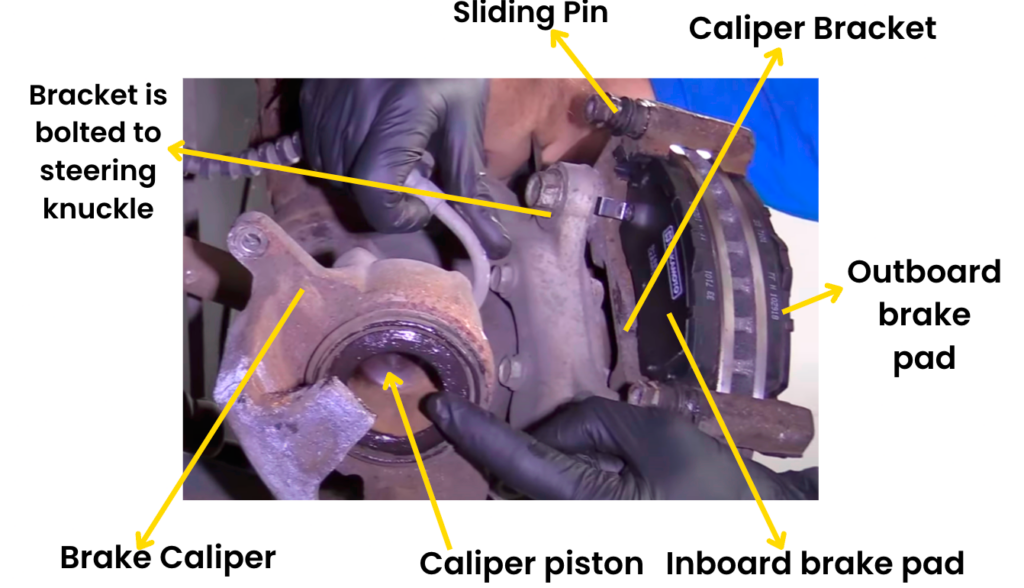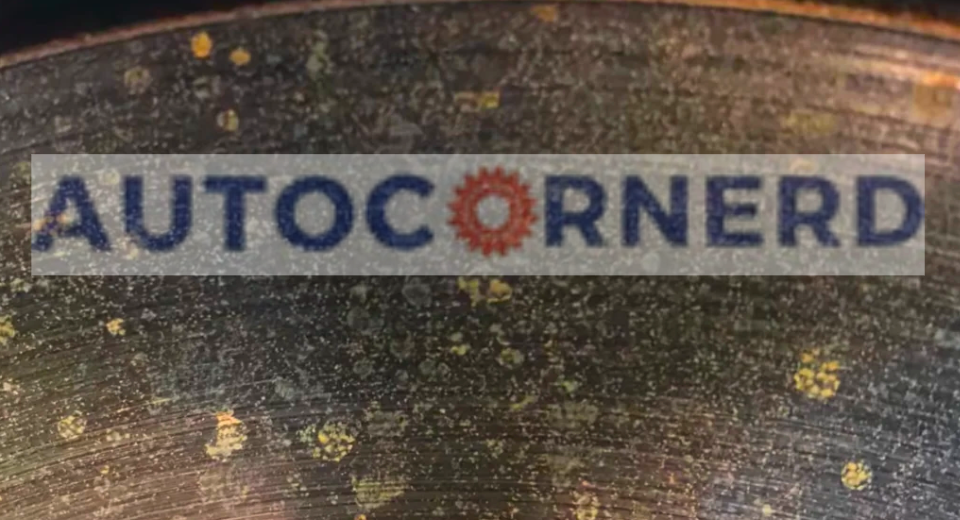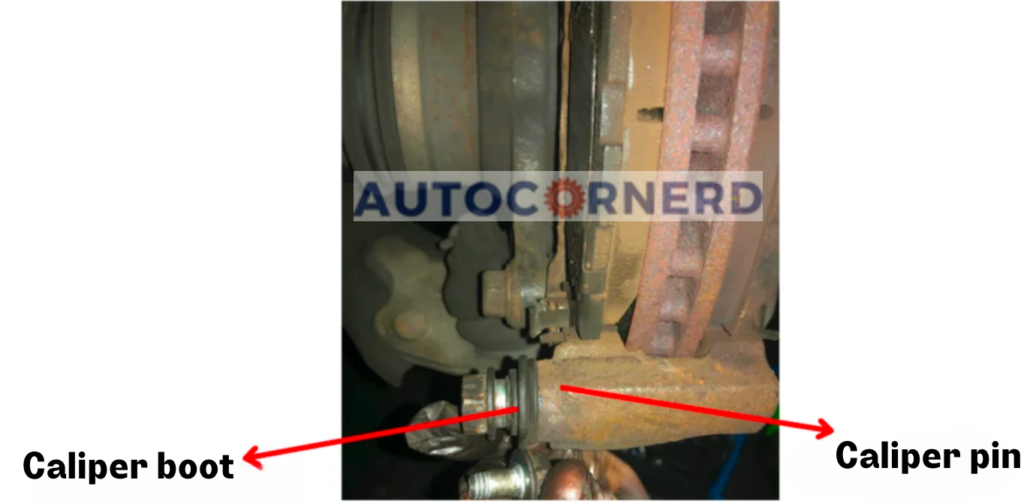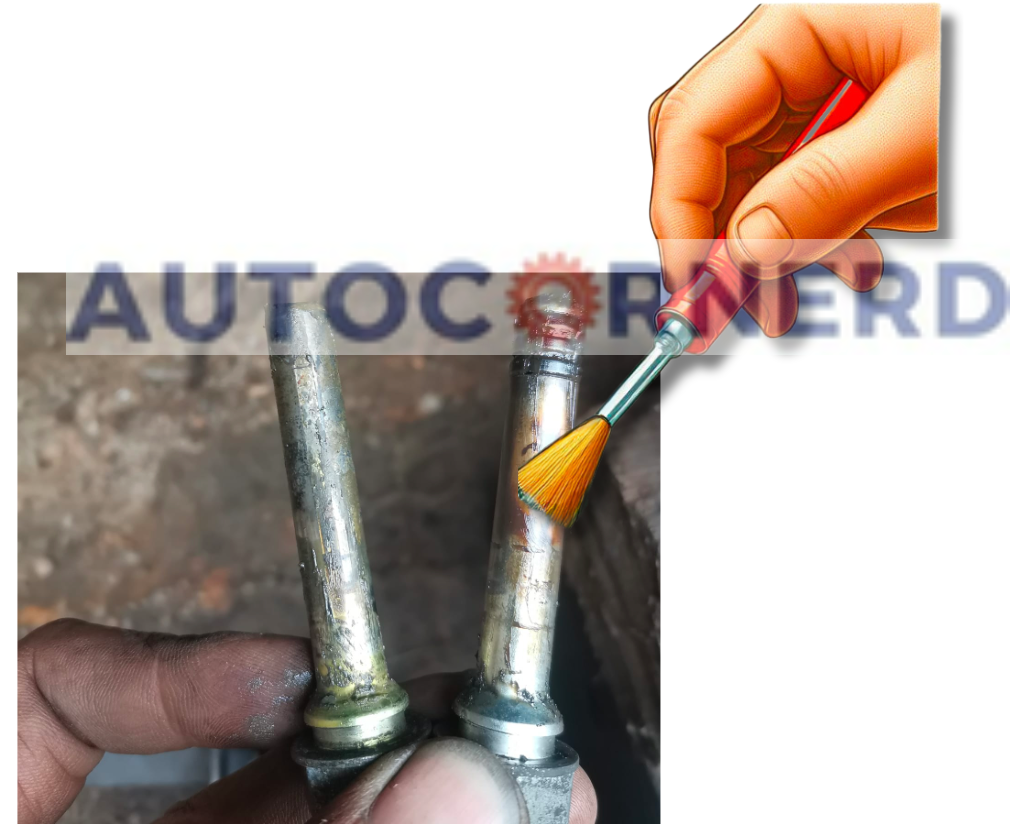Why Do My Brakes Squeak In The Morning?
Brakes can squeak in the morning due to moisture accumulation and lack of lubrication. When a car sits overnight, dew and humidity cause moisture to build up on the brake rotors. Hitting the brakes wipes this away, allowing a slight rust layer to briefly form that grinds and squeaks. Also, calipers and pads need to move freely to work properly. If sticky from lack of lubricant, they squeak when first used after sitting.
Ever woken up to those annoying brake squeals? It’s frustrating when your car’s brakes make loud noises first thing in the morning. The likely culprits? Moisture and rust buildup on brake pads overnight. Not to worry – in this quick guide we’ll break down the common causes of morning brake squeaking and simple fixes to quiet things down.
You can also read my guide on causes of Groaning noise when braking at low speed.
If you want to get a quick answer, you can chat with a virtual mechanic for free.
Below, I have explained the key components of disc brakes with pictures. This will help in pinpointing the root causes of brakes squeaking quite easily. If you have preliminary knowledge, you can jump straight to the causes section.
In the last section, I’ve included comments from forums where users share firsthand experiences of brakes squeaking in the morning. Be sure to check out that section for real insights.
- Morning dew causes moisture buildup on brake discs, leading to squeaking when brakes are first applied. Hitting brakes initially wipes away moisture.
- Brake caliper pins can get sticky, preventing pads from properly retracting. This causes extra vibration and noise. Lubrication helps.
- Cold overnight causes brake parts to contract. Initial braking then causes extra friction and squeaking. Warmup first helps.
- Rust layer forms on moist brake discs overnight. Braking initially scrapes this away noisily. Pre-driving warms and dries.
My Personal Experience With Brakes Squeaking In The Morning
My colleague drives an older Toyota Camry that would squeal loudly when first braking in the morning. I suspected moisture buildup was the culprit. Inspecting the brakes, I found rust on the brake discs and sticky caliper pins. I sanded off the rust, cleaned the pins, and applied high-temp lubricant. The next morning—no more squeal!
Overview of Disc Brakes: Key Components and Mechanics

Disc brakes consist of the following components:
- Caliper
- Caliper guide pins
- Caliper bracket
- Brake pads
- Brake disc
Caliper
The caliper is the part that actually applies force to the brake pads. It is a clamp-like mechanism that moves with the help of brake fluid from the brake pedal. When this happens, the caliper applies pressure to the brake pads, forcing them to move towards the rotor.
Caliper Guide Pins and Bracket
Caliper guide pins ensure that the brake pads remain in contact with the rotor equally. These small metal pins allow the caliper assembly to move freely in the correct direction, promoting even wear on the brake pads. The caliper bracket connects the caliper to the steering knuckle and suspension system, and it is essential for this connection to be strong and stable.
In the below video, you can see how caliper moves along the guide pins:
Brake Pads
Brake pads are seated in the caliper bracket. While each wheel has two brake pads, the inboard pad is located on the inside of the rotor (closest to the vehicle’s center), and the outboard brake pad is located on the outside of the rotor (farthest from the center). When pressure is applied to the brake pedal, the pads grip both sides of the rotor, generating friction to slow down or stop the vehicle.
Brake Disc
The brake disc or rotor is attached to each wheel and spins along with it. When the brake pedal is pressed, the caliper squeezes the brake pads against the rotor surface, creating friction that ultimately slows down the rotation of the wheel and the vehicle itself.
Hydraulic Action of Brake Caliper
When the driver presses the brake pedal, hydraulic fluid is pushed through the brake lines and into the caliper. The piston, in turn, presses the inboard brake pad against the rotor.
Meanwhile, the brake fluid exerts force in the opposite direction, moving the brake caliper along the caliper pin. Due to this action, the outboard brake pad is also pressed, causing the brake disc to be squeezed between both brake pads and apply stopping power.
Recoiling of Brake Pads After Brake Pedal Is Released
The brake caliper piston has a square edge seal, which helps the piston move and apply the pressing force. When the driver releases the brake pedal, the pressurized brake fluid is no longer present, causing the seal on the piston to snap back into its original shape. This action pulls the piston back slightly, creating a small gap between the brake pad and the rotor.
The square edge seal on the caliper piston creates a kind of resistance to rolling over, which helps create the necessary margin clearance needed to separate the brake pad from the rotor surface.
Once the rotor starts turning again, centrifugal force is used to produce a pocket of air around the rotor, which assists in pushing the brake pads back from the rotor surface. The presence of dirt and air gaps in the pads can impact this process, which is why keeping lubricated pads and slide pins and removing air gaps is essential for maintaining proper brake pads pressing and retraction.
Bonus Read: Why do my brakes squeak when I first start driving
Causes Of Brakes Squeaking In The Morning
Brake squeaking occurs when the brake pads vibrate against the brake disc, causing a high-pitched noise. When moisture is present on the brake disc, it can cause the brake pads to stick and vibrate more than usual, resulting in a louder noise.
So, keeping in view this, here are the causes of brakes squeaking in the morning:
1. Morning Dew Results in Wet Brake Discs and Squeaking

When a vehicle is parked overnight, the brake discs become exposed to the elements. The moisture in the air can condense on the surface of the brake discs.
Since brake discs are made of metal, this moisture can cause a thin layer of rust to form on the surface of the disc, which can make the brakes squeak when they are applied in the morning as the brake pads tend to scrape off the rust layer on the brake disc. The rust on the brake disc can also cause the brakes to feel less responsive or even stick.
Also, if you let your car sit for a long time with the above condition, the rust could be bad enough and could spread all over the brake rotor.
If brake pads are metallic, they will also develop rust, and cause squealing noise from the brakes in the morning.
Apart from the rust resulting from moisture, brake pads also tend to stick to the moistened surface of the brake disc, causing a high-frequency vibration. This vibration further generates noise, which can be quite annoying for the driver and passengers.
How to fix rust layer on brake rotor?
One way to prevent brake squeaking due to the rust layer on the brake rotor is by driving your car around for a few minutes in the morning before applying the brakes. This will allow the brake discs to heat up and evaporate any moisture that may have developed overnight.
Fixing brakes that squeak due to moisture and rust buildup involves a relatively complex procedure. The process requires removing the wheel, brake calipers, and brake pads. After that, spraying CRC brake cleaner onto the brake disc and utilizing a steel brush to scrub and wipe it with a shop towel.
Make sure to thoroughly clean the brake disc. If particles of brake cleaner are left on the disc, they will damage the surface of the brake pad that is in contact with the brake disc.
Lastly, if rust has also formed on the brake pads, take 180 to 200 grit sand paper and sand down the brake pad surface to remove contaminants.
2. Seized Calipers Prevent Pad Retraction, Cause Noise

Stuck brake pads due to a seized brake caliper, specifically the pin that holds the caliper in place, can also be the cause of brakes squeaking in the morning.
The caliper is responsible for moving the brake pads in and out as the brakes are applied and released. The brake caliper moves on a set of pins when you press the brake pedal.
When the caliper pin becomes seized, the caliper can’t move freely to allow the brake pads to properly release from the rotor.
This can cause the brake pads to remain in contact with the rotor, even when the brake pedal is released. As a result, the brake pads can wear down more quickly, and you may notice a squeaking sound when you apply the brakes.
How to fix seized brake calipers?

To maintain your brake system, you will need a brake cleaner and wire brush to eliminate any debris or rust present on the brake caliper pin. Additionally, ensure that the debris and dirt inside the caliper pinhole must also be removed.
To clean the caliper bore where the pin moves, use a brush that fits. Dip a bore brush or cotton swab into the cleaning solution and carefully wipe the hole’s interior.
After cleaning, apply a high-temperature brake lubricant to help prevent friction and ensure smooth movement. I recommend this particular lubricant for optimal results.
3. Vibrating Brakes Call For Timely Lubrication
Brake pads seat into the retaining clips of the caliper mounting bracket as shown in the figure below:

Brake pads move smoothly on retaining clips when brake caliper applies pressure.
Insufficient lubrication prevents smooth movement of brake pads, hindering their ability to recoil after releasing the brake pedal.
Consequently, brake pads stay in contact with the brake disc, causing vibration and producing a squeaking or squealing noise.
This is more pronounced in the morning when the dew on the rotor increases the stickiness between the brake pads and rotor, exacerbating the vibration and noise.
How to fix vibrating brake pads causing squeaking noises?
Due to the trapping of moisture, brake pads do not glide smoothly. So, you need to remove them and apply high-temperature lubricant on the ends of the brake pad that are in contact with retaining clips. I would recommend ATE Plastilube Grease. Make sure that you clean any dirt and rust before applying the grease.
4. Cold Causes Brake Parts Shrinking & Noisy Operation
When the temperature drops overnight, moisture can accumulate on the metal parts of your car, including the brake rotors and pads.
This can make the brakes feel more slippery and sensitive, leading to a squeaking noise when you apply pressure to the brake pedal.
Additionally, the cold temperature causes the metal in the brake rotors and pads to contract, making them harder and less pliable.
As a result, when you apply the brakes, the pads create more friction than usual, resulting in a squeaking sound. This is especially noticeable in the morning when the brakes have been exposed to the cold for a long time.
How to fix?
One simple way to reduce the amount of moisture on your brake system is to give your car a few extra minutes to warm up before you hit the road. This can help evaporate any moisture that may have accumulated overnight and also give your engine and other systems a chance to warm up to operating temperature.
After you lightly apply the brakes a few times, they will heat up, and the moisture layer will be gone along with your squealing noises.
Lastly, try to avoid slamming on your brakes in cold weather, as this can increase the friction between your brake pads and rotors.
Some First Hand Experiences Shared By Users In Different Communities
Our team conducted research across various online communities, forums, and subreddits to gather user comments and opinions on “brakes squeaking in the morning”.
User 1 says:
Noticed squeaking brakes in the morning with my Hyundai Tucson. My mechanic found out that the brake pad shims were corroded. Replacing them with new, high-quality shims solved the problem.
User 2 says:
I own a Ford Ranger, and I noticed the squeaking in the mornings, especially in colder weather. I learned it was due to condensation on the brake discs. Once the brakes warmed up, the noise stopped. Regular maintenance has kept it minimal.
User 3 says:
In my Honda Odyssey, the brakes squeaked every morning. After some investigation, I found that the brake pads were the culprit, specifically due to moisture and dew. Changing to ceramic brake pads made a huge difference.”
